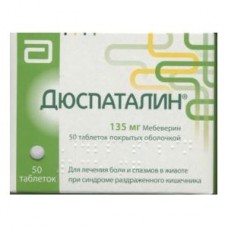Expiration date: 02/2026
Code ATX: A03AA04 (Mebeverine)
Active substance: mebeverine (mebeverine)
Dosage form
DUSPATALIN® tab., pokr. shell, 135 mg: 10, 15, 20, 30, 40, 50, 60, 90, 100 or 120 PCs.
reg. ? : LP-001454 from 25.01.12-Current
Product form, composition and packaging
Tablets, coated white, round.
1 tablet contains:
mebeverine hydrochloride 135 mg
Excipients: lactose monohydrate-97 mg, potato starch-45 mg, povidone K25-5.5 mg, talc-12 mg, magnesium stearate-5.5 mg.
Shell composition: talc-40 mg, sucrose-79 mg, gelatin-0.4 mg, acacia gum-0.4 mg, Carnauba wax-0.3 mg.
Clinical and pharmacological group: Myotropic antispasmodic
Pharmaco-therapeutic group: Antispasmodic
Pharmacological action
Spasmolytic myotropic action. It reduces the tone and reduces the contractile activity of the smooth muscles of the gastrointestinal tract (mainly the large intestine).
Pharmacokinetics
When ingested, it is subjected to presystemic hydrolysis and is not detected in plasma. It is metabolized in the liver to veratric acid and mebeverine alcohol. It is excreted mainly by the kidneys in the form of metabolites, in small quantities-bile (completely - within 24 hours).
Indications
Spastic conditions of the gastrointestinal tract, caused by organic diseases. Symptomatic treatment of pain, spastic conditions, discomfort with irritable bowel syndrome.
Codes ICD-10 Code ICD-10 Indication
K58 irritable bowel Syndrome
R10.1 Pain localized to the upper abdomen
R10.4 Other and unspecified pain in the abdomen (colic)
Dosage regimen
Take inside 100 mg 4 times or 135 mg 3 times / day. When the desired clinical effect is achieved, the dose is gradually reduced for several weeks.
Side effect
Possible: nausea, allergic reactions, dizziness, headache, diarrhea, constipation.
Contraindications to use
- Pregnancy, hypersensitivity to mebeverine.
- Use during pregnancy and breast-feeding
- Mebeverine is contraindicated in pregnancy.
Special instruction
Impact on the ability to drive and operate machinery
During treatment should refrain from driving vehicles and activities potentially hazardous activities, require high concentration and psychomotor speed reactions.
________________________________________________________
Trade name: Duspatalin (Duspatalin)
International name: Mebeverine&,, (Mebeverine)
Pharmacological group: antispasmodic agent
Pharmacological group on ATX: A03AA04. Mebeverine
Pharmacological action: antispasmodic
Pharmacodynamics:
Spasmolytic myotropic action, has a direct effect on the smooth muscles of the gastrointestinal tract without affecting the normal intestinal peristalsis.
The exact mechanism of action is unknown, but numerous mechanisms, such as reduced permeability of ion channels, blockade of norepinephrine reuptake, local anesthetic action, as well as changes in water absorption, can cause local action of mebeverine on the gastrointestinal tract. Through these mechanisms, mebeverine has antispasmodic effect, normalizing intestinal peristalsis and not causing constant relaxation of smooth muscle tissue of the gastrointestinal tract ("hypotension"). There are no systemic side effects, including anticholinergics.
Pharmacokinetics:
Coated tablets
Suction
Mebeverine is rapidly and completely absorbed after ingestion.
Distribution
When taking repeated doses of the drug significant accumulation does not occur. Metabolism
Mebeverine hydrochloride is mainly metabolized by serum esterases, which at the first stage splits the air on vertrouw acid and alcohol mebeverine. The main metabolite circulating in plasma is demethylated carboxylic acid. The half-life in the equilibrium state of demethylated carboxylic acid is approximately 2, 45 hours. when taking repeated doses, the maximum concentration of demethylated carboxylic acid in the blood (Cmax) is 1670 ng/ml, the time to reach the maximum concentration of demethylated carboxylic acid in the blood (Tmax) is 1 hour.
Breeding
Mebeverine as such is not excreted from the body, but is fully metabolized, its metabolites are almost completely excreted from the body. Veratric acid is excreted by the kidneys. Alcohol mebeverine also excreted by the kidneys, partly in the form of carboxylic acid and partly in the form demetilirovaniu carboxylic acid.
Indications for use:
Symptomatic treatment of pain, spasms, dysfunction and discomfort in the intestine associated with irritable bowel syndrome. Symptomatic treatment of spasms of the gastrointestinal tract (including those caused by organic diseases).
Symptoms may include abdominal pain, cramps, bloating and flatulence, changes in stool frequency (diarrhea, constipation or alternation of diarrhea and constipation), changes in stool consistency.
Contraindications:
coated tablets:
- Hypersensitivity to any component of the drug.
- Age up to 18 years.
- Congenital intolerance to galactose (lactose) or fructose, lactase deficiency, sucrose/isomaltase deficiency, glucose-galactose malabsorption syndrome.
- Pregnancy and breastfeeding.
Dosage regimen:
For oral administration.
Tablets should be swallowed, without chewing, drinking enough water (at least 100 ml).
One tablet 3 times a day, about 20 minutes before meals.
The duration of the drug is not limited.
If the patient has forgotten to take one or more doses, the drug should be continued with the next dose. Do not take one or more missed doses in addition to the usual dose.
Studies of dosing regimen in elderly patients, patients with renal and/or hepatic insufficiency were not conducted. Available data on the post-marketing use of the drug did not reveal specific risk factors in its use in elderly patients and patients with renal and/or hepatic insufficiency. Changes in dosing regimen in elderly patients and patients with renal and/or hepatic insufficiency is not required.
Side effect:
The reported side effects were spontaneous and there was insufficient data to accurately assess the frequency of cases.
Allergic reactions were observed mainly from the skin, but there were also other manifestations of Allergy.
From the skin:
Urticaria (allergic rash), angioedema (serious allergic reaction, which may include: difficulty breathing, swelling of the face, neck, lips, tongue, throat), swelling of the face, exanthema (skin rash).
From the immune system:
Hypersensitivity reactions (anaphylactic reactions - serious allergic reactions, which may include: difficulty breathing, rapid pulse, a sharp decrease in blood pressure (weakness and dizziness), sweating).
If there is any of the side effects, including not listed in this leaflet, you should stop taking the drug, Duspatalin and immediately consult a doctor.
Overdose:
In case of overdose, Duspatalin should immediately consult a doctor.
Symptoms
Theoretically, in the case of overdose may increase the excitability of the Central nervous system. In cases of an overdose of mebeverine, the symptoms were either absent or insignificant and, as a rule, quickly reversible. The observed symptoms of overdose were neurological and cardiovascular in nature.
Treatment
The specific antidote is unknown. Symptomatic treatment is recommended. Gastric lavage is necessary only if intoxication is detected within approximately one hour after taking several doses of the drug. Measures to reduce absorption are not required.
Interaction:
Only studies on the interaction of this drug with alcohol were conducted. Studies on animals have demonstrated the absence of any interaction between the drug, Duspatalin and ethyl alcohol.
Special instruction:
Before taking this medication, Duspatalin you should consult with your doctor in case of:
- if the symptoms of the disease occurred for the first time,
- unintended and unexplained weight loss,
- anemias,
- rectal bleeding or blood impurities in the stool,
- fevers,
- if someone in the family of the patient was diagnosed with colon cancer, celiac disease or inflammatory bowel disease,
- over the age of 50 years and if the symptoms of the disease occurred for the first time,
- recent use of antibiotics.
You should consult a doctor if the background of the drug the condition worsens or no improvement of symptoms after 2 weeks of use.
Use during pregnancy and breastfeeding, effect on fertility
Pregnancy
There are only very limited data on the use of mebeverine in pregnant women. Animal studies are not sufficient to assess reproductive toxicity. Not recommended, Duspatalin during pregnancy.
Breastfeeding period
Information about the excretion of mebeverine or its metabolites in breast milk is not enough. Studies of the excretion of mebeverine into milk in animals have not been conducted. Should not take Duspatalin during breast-feeding.
Fertility
Clinical data on the effect of the drug on fertility in men or women, however, the known animal studies have not demonstrated adverse effects of the drug, Duspatalin.
Influence on the ability to drive and other mechanisms
Studies of the effect of the drug on the ability to drive and other mechanisms have not been conducted. The pharmacological properties of the drug, as well as the experience of its use do not indicate any adverse effect of möbeverin on the ability to drive and other mechanisms.


